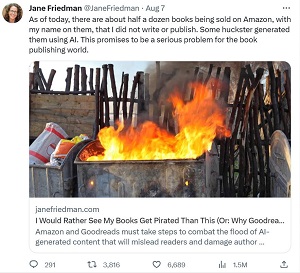News
AWS Requires Kindle Publishers to Reveal AI-Generated Content
Amazon Web Services (AWS) is now asking self publishers on its Kindle platform to indicate whether their new content is generated by AI.
The cloud giant isn't alone in wrestling with AI-generated content and the possible copyright and intellectual property concerns that could result, as Microsoft just announced it would assume responsibility for copyright risks associated with the use of its Copilot AI assistants.
The day before that announcement, AWS unveiled the "Addition of AI Questions to KDP Publishing Process."
"We are actively monitoring the rapid evolution of generative AI and the impact it is having on reading, writing, and publishing, and we remain committed to providing the best possible shopping, reading, and publishing experience for our authors and customers," AWS said. "To that end, beginning today, when you publish a new title or make edits to and re-publish an existing title through KDP, you will be asked whether your content is AI-generated. Learn more about how we define AI-generated content."
AWS didn't indicate what it would do if publishers said their content was generated by AI, but its KDP Content Guidelines state that content will be rejected or removed from the Kindle platform if it violates the guidelines. Those rules prohibit illegal or infringing content, offensive content, content contributing to a poor customer experience, or public domain content. They also include this passage:
Artificial intelligence (AI) content (text, images, or translations)
We require you to inform us of AI-generated content (text, images, or translations) when you publish a new book or make edits to and republish an existing book through KDP. AI-generated images include cover and interior images and artwork. You are not required to disclose AI-assisted content. We distinguish between AI-generated and AI-assisted content as follows:
- AI-generated: We define AI-generated content as text, images, or translations created by an AI-based tool. If you used an AI-based tool to create the actual content (whether text, images, or translations), it is considered "AI-generated," even if you applied substantial edits afterwards.
- AI-assisted: If you created the content yourself, and used AI-based tools to edit, refine, error-check, or otherwise improve that content (whether text or images), then it is considered "AI-assisted" and not "AI-generated." Similarly, if you used an AI-based tool to brainstorm and generate ideas, but ultimately created the text or images yourself, this is also considered "AI-assisted" and not "AI-generated." It is not necessary to inform us of the use of such tools or processes.
You are responsible for verifying that all AI-generated and/or AI-assisted content adheres to all content guidelines. For example, to confirm an AI-based tool did not create content based on copyrighted works, you're required to review and edit any AI tool outputs.
 [Click on image for larger view.]Jane Friedman on fake books under her name: 'Some huckster generated them using AI' (source: X).
[Click on image for larger view.]Jane Friedman on fake books under her name: 'Some huckster generated them using AI' (source: X).
The guidelines amendments follow complaints lodged last month by Kindle author Jane Friedman about "garbage books getting uploaded to Amazon where my name is credited as the author."
Her series of posts included this: "We desperately need guardrails on this landslide of misattribution and misinformation. Amazon and Goodreads, I beg you to create a way to verify authorship, or for authors to easily block fraudulent books credited to them. Do it now, do it quickly."
Apparently, Amazon did, but it's not clear what the company will do if publishers answer "yes" to the AI question, or how it will determine if new AI-generated content could cause legal problems and should be removed. The amended guidelines seem to put the onus on creators to ensure their AI-generated content doesn't infringe on copyrights, which wouldn't do much to address the "huckster" reverse plagiarism conundrum.
About the Author
David Ramel is an editor and writer at Converge 360.